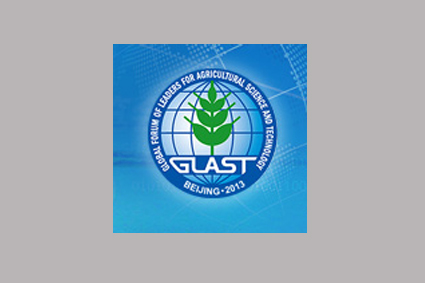
GFAR Secretariat senior staff participated in the 4th Global Forum of Leaders in Agricultural Science and Technology (GLAST-2013), 5-6 June in Beijing. The Chinese Academy of Agricultural Sciences (CAAS) periodically hosts the Forum as a major venue to share experience and ideas on policies and mechanisms for promotion of developing countries’ capacity and coordination among institutions on agricultural scientific innovation. Such innovation impacts directly on national economic development, poverty alleviation and food security. The 30th Anniversary of China-CGIAR collaboration was also celebrated at the Forum.
Participants shared experiences and ideas on effective methods in agricultural extension and technology transfer. Also discussed were new themes for agricultural research that may have strategic implications for long term improvements in agriculture productivity, food security and safety, and sustainable development, as well as strategies and initiatives for “South-South” and “North-South” cooperation in agricultural science and technology, and development of agro-industry and agribusiness.
Professor Li Jiayang, Vice Minister, Ministry of Agriculture, P.R. China and President of CAAS stressed that the Academy initiated and hosted the GLAST in 2006 with FAO and CGIAR as co-sponsors. Preceding GLAST meetings were in 2006, 2007 and 2010. The GLAST meetings have evidenced a catalytic, effective role to share information and experience, as well as to promote partnerships among national agricultural research institutions and international organizations. The gathering has become a major opportunity for leaders of national agricultural research institutions, focused on developing countries, to consider solutions to the challenges facing agricultural development and new initiatives for cooperation. In this vein the GLAST-2013 theme was “Science Innovation, Technology Transfer and Agribusiness Development”. The plenary presentations, sessions and panels highlighted new ideas on addressing key international challenges in agricultural research for development.
The FAO Director-General, Dr. José Graziano da Silva, stressed in his keynote address FAO’s commitment to ending hunger, guaranteeing food security for all and increasing sustainable agricultural production. FAO is sharpening the focus of its work and changing the way it works to contribute concretely to this commitment. In this regard FAO and CGIAR, together with CAAS and many other institutions, collaborated on the preparation of a collective Roadmap coming out of the Global Conference on Agricultural Research for Development (GCARD) process. The Roadmap establishes a common, multi-stakeholder framework of partners in the Global Forum on Agricultural Research (GFAR). The Roadmap outlines the collective actions and transformative changes in systems of research, extension, education and enterprise required to have maximum impact for smallholder and family farmers and enhance their roles as the actors fundamental to eliminating hunger and malnutrition around the world.
At the GLAST-2013 Ajit Maru, GFAR Senior Officer for Capacity Development, co-chaired a session;Thomas Price, GFAR Senior Officer, Agricultural Innovation and Society, spoke as part of a panel discussion amongst experts on Global Cooperation in Agricultural Science and Technology. Dr Maru also contributed to the BRICS Workshop on collaborative initiatives in South-South Collaboration in Agricultural Research for Development. In particular he highlighted the results of the conference organized with CAAS in 2010 on the role of fast growing economies in international agricultural research for development.
FAO Director General on FAO and GFAR at the Global Forum of Leaders in Agricultural Science and Technology (GLAST-2013) in Beijing, China:
